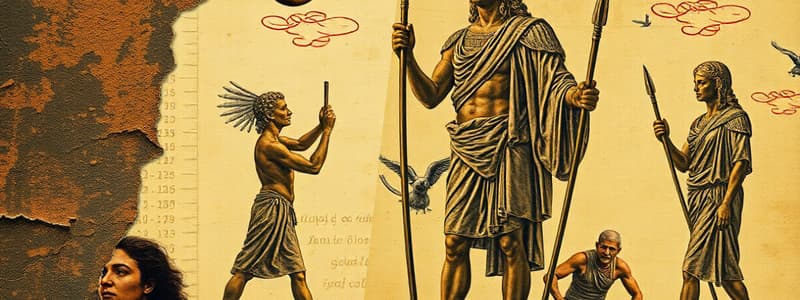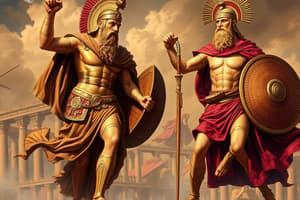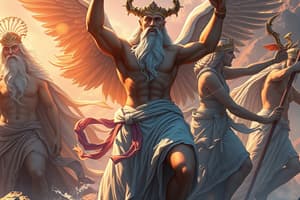Podcast
Questions and Answers
What was a significant outcome of the Peloponnesian War for the Greek city-states?
What was a significant outcome of the Peloponnesian War for the Greek city-states?
- It strengthened the diplomatic ties between Athens and Sparta.
- It led to the unification of all Greek city-states under Athenian rule.
- It resulted in the immediate rise of Macedonian power in Greece.
- It caused the decline of Athenian democracy and military power. (correct)
How did Alexander the Great contribute to Hellenistic culture?
How did Alexander the Great contribute to Hellenistic culture?
- By promoting local traditions over Greek influences.
- By establishing a purely Greek culture throughout his empire.
- Through the integration of Eastern cultures with Greek traditions. (correct)
- By fostering rivalry between Greek city-states.
What role did the Parthenon play in ancient Athens?
What role did the Parthenon play in ancient Athens?
- It acted as a diplomatic headquarters for the region.
- It served as a central bank and tax repository. (correct)
- It was primarily a royal palace for the Athenian leaders.
- It functioned as a military fortress.
Why were the Macedonians regarded as semi-barbarians by the Greeks?
Why were the Macedonians regarded as semi-barbarians by the Greeks?
What did the establishment of the maritime union in Athens signify?
What did the establishment of the maritime union in Athens signify?
What was one significant characteristic of the Greek Dark Ages?
What was one significant characteristic of the Greek Dark Ages?
What poetic works are attributed to Homer?
What poetic works are attributed to Homer?
Which period is largely characterized by the existence of city-states (polis) across Greece?
Which period is largely characterized by the existence of city-states (polis) across Greece?
What evidence exists regarding the historicity of the Trojan War?
What evidence exists regarding the historicity of the Trojan War?
In which age did significant advances in philosophy and political thought occur, such as the works of Socrates, Plato, and Aristotle?
In which age did significant advances in philosophy and political thought occur, such as the works of Socrates, Plato, and Aristotle?
What institution featured prominently in Greek culture during the Classical Age?
What institution featured prominently in Greek culture during the Classical Age?
How was the Greek alphabet influenced by earlier cultures?
How was the Greek alphabet influenced by earlier cultures?
What is a significant aspect of the cultural spread during the Archaic Age?
What is a significant aspect of the cultural spread during the Archaic Age?
What significant structure is associated with Mycenaean architecture, indicated by its enormous size?
What significant structure is associated with Mycenaean architecture, indicated by its enormous size?
Which item found in Mycenaean shaft graves is known for its significance in burial practices?
Which item found in Mycenaean shaft graves is known for its significance in burial practices?
What was the likely role of the 'mistress or lady' referenced in the Linear B tablets?
What was the likely role of the 'mistress or lady' referenced in the Linear B tablets?
What transition marked the onset of the Dark Ages around the 10th century BC?
What transition marked the onset of the Dark Ages around the 10th century BC?
What common theme characterizes the gods listed in the Linear B tablets?
What common theme characterizes the gods listed in the Linear B tablets?
Which factors are theorized to have contributed to the end of the Mycenaean Age?
Which factors are theorized to have contributed to the end of the Mycenaean Age?
In which century is the Iliad and Odyssey attributed to Homer believed to have been composed?
In which century is the Iliad and Odyssey attributed to Homer believed to have been composed?
What became a significant aspect of Mycenaean society, indicated by their naval dominance?
What became a significant aspect of Mycenaean society, indicated by their naval dominance?
Flashcards
Athenian Democracy
Athenian Democracy
A form of government in ancient Athens where citizens participated in decision-making.
Spartan Military
Spartan Military
A highly militaristic society in ancient Greece focused on strength and preparedness for war.
Peloponnesian War
Peloponnesian War
A war between Athens and Sparta that weakened the Greek city-states.
Herodotus
Herodotus
Signup and view all the flashcards
Macedonian Kingdom
Macedonian Kingdom
Signup and view all the flashcards
Alexander the Great
Alexander the Great
Signup and view all the flashcards
Hellenistic Culture
Hellenistic Culture
Signup and view all the flashcards
Greco-Persian Wars
Greco-Persian Wars
Signup and view all the flashcards
Cyclopean Walls
Cyclopean Walls
Signup and view all the flashcards
Shaft Graves
Shaft Graves
Signup and view all the flashcards
Tholos Tombs
Tholos Tombs
Signup and view all the flashcards
Mask of Agamemnon
Mask of Agamemnon
Signup and view all the flashcards
Linear B Tablets
Linear B Tablets
Signup and view all the flashcards
Mycenaean Religion
Mycenaean Religion
Signup and view all the flashcards
End of Mycenaean Age
End of Mycenaean Age
Signup and view all the flashcards
Homer
Homer
Signup and view all the flashcards
Trojan War
Trojan War
Signup and view all the flashcards
Greek Dark Ages
Greek Dark Ages
Signup and view all the flashcards
Mycenaean/Helladic Period
Mycenaean/Helladic Period
Signup and view all the flashcards
Classical Age/Golden Age
Classical Age/Golden Age
Signup and view all the flashcards
Archaic Period
Archaic Period
Signup and view all the flashcards
Polis
Polis
Signup and view all the flashcards
Alphabet
Alphabet
Signup and view all the flashcards
Oracle of Delphi
Oracle of Delphi
Signup and view all the flashcards
Olympic Games
Olympic Games
Signup and view all the flashcards
Study Notes
Classical Literature: Historical Background of Greek Mythology
- This topic covers the historical background of Greek Mythology.
- The study encompasses the Paleolithic, Neolithic, and Bronze Ages, including Minoan and Mycenaean civilizations.
Paleolithic and Neolithic Periods (Stone Age)
- Settlement in Paleolithic times (before 70,000 BC) had limited information.
- Evidence from the Neolithic period (6000-3000 BC) is more abundant.
- Settled agricultural communities existed during the Neolithic period.
- Inhabitants migrated from the east and north.
- Religion was present during the period.
- Female figurines show exaggerated sexuality, possibly linked to fertility.
- Male figurines are less numerous, and some show visible sexuality.
- Understanding of worship and rituals as well as the roles of males and females is limited and unreliable.
Bronze Age
- Migration from Asia Minor to the southern Peloponnese and into Greece.
- Three regions: Greece (Hellas), Crete (Minoan civilization), and the Islands (Cycladic).
- Bronze Age is split into Early, Middle, and Late Bronze Ages.
- Terminology differs based on period and geography.
Minoan Civilization
- Knossus was the capital of Minoan civilization, a thalassocracy.
- Minoan power extended over Aegean islands and mainland Greece.
- No walls existed in Knossus, implying confidence in sea-based security.
- Minoan legend involved Labyrinth, the Minotaur, and Theseus.
- Minos, Pasiphae, Androgeus, and Ariadne are figures of Minoan civilization.
- There were religious affiliations with the bull and snake goddess.
- Sophisticated art, architecture, and painting showed a high sense of religion, emphasizing bulls and snakes.
Mycenaean (Helladic) Age
- Hellas vs. Greece and the Greek legendary figure Hellen.
- Indo-Europeans arrived and spoke Greek during the Late Helladic period.
- The Mycenaean civilization flourished (1600-1100 BC), interacting with Minoans.
- Mycenaeans demonstrated expertise and advanced art styles in palaces and pottery.
- Their architecture is reflected in cyclopean walls, impressive structures that include religious symbols of lions and royal family.
- Grave goods unearthed, such as masks, jewelry, and weapons, offer insights into their beliefs and practices related to the afterlife.
- Clay tablets have revealed insights into their religion (Linear B tablets).
Religion and Linear B Tablets
- Clay tablets, preserved in conflagrations, detailed Mycenaean religion.
- Depicted deities like Zeus and Hera, and practices mirroring Homer's Olympians.
- Tablet content suggests fertility goddesses, sacrificial rites, and rituals.
End of the Mycenaean Age and Homer
- The 10th century BC marked a transition period from the Late Bronze Age.
- Theories for this transition include internal conflicts and Dorian invasions.
- Possible explanations include the Dark Ages (1100-800 BC).
- Homer, known as the blind poet, composed Iliad and Odyssey, reflecting oral traditions and earlier generations. The timeline is debated.
Did the Trojan War Really Happen
- Research suggests that the Trojan War's actuality is still debated.
- Evidence for and against it's existence is explored in various perspectives.
Historical Timeline
- This timeline maps major events and figures throughout Greek history, showcasing the shift from the Mycenaean Age to the Roman Empire.
- Specific dates and eras for the periods are identified.
Archaic Age
- Independent city-states (poleis) dominated the Greek world and extended influence through trade.
- The development of democracy, aristocracy, and diplomacy marked Athens and Sparta's rise.
- Increased Greek presence via trade and colonization spread across Europe.
Golden Age of Athens
- A maritime union united city-states.
- Athens held a central treasure (Parthenon) and maintained peace with other city-states.
- Despite success, Athens faced rivalry, particularly from Sparta.
- The Peloponnesian War signified the culmination of this era.
Macedonian Kingdom
- Distantly related to Greeks but regarded less favorably.
- The Peloponnesian War weakened other Greek city-states.
- Aristotle tutored Alexander the Great.
Alexander the Great
- Alexander the Great inherited Philip II's empire, defeating Darius and expanding it immensely.
- He established an Hellenistic culture that blended Greek and Eastern traditions.
- Alexander's untimely death led to the decline of his empire.
- Numerous cities are mentioned including Alexandria located in various regions, which were founded by or destroyed during Alexander's rule.
Studying That Suits You
Use AI to generate personalized quizzes and flashcards to suit your learning preferences.




